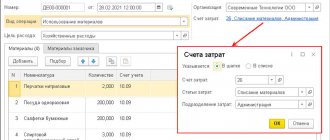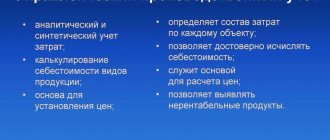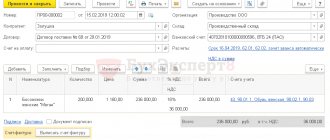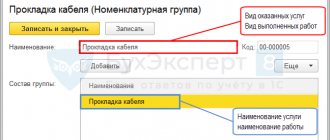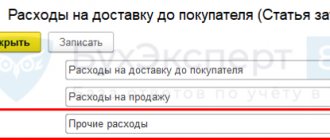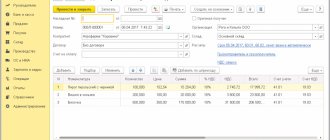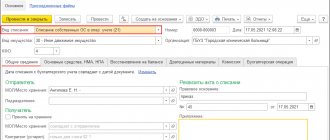Payments from the Social Insurance Fund
The main subsidies paid from the Social Insurance Fund are the following payments:
- temporary disability benefits, postings will be presented below;
- for pregnancy and childbirth;
- in connection with registration in the early stages of pregnancy;
- at the birth of a child;
- caring for a child up to one and a half years old;
- when adopting a child;
- caring for a sick child or other family member;
- additional days off to care for disabled children;
- upon receipt of a work injury;
- at burial.
In another article, we provided a detailed breakdown of the list of such payments and methods for calculating them.
Compensation of costs and its reflection in accounting
Expenses made for the benefit of another person are usually reimbursed. Let's consider what tax accounting will be like for both parties
Most often, expenses are reimbursed to those who incurred them as a result of fulfilling obligations under transactions. In most cases, employees' expenses associated with their duties are also reimbursed. We will find out what taxable income arises, whether the tax base can be reduced, and whether taxes or contributions need to be assessed on workers’ compensation payments. Civil contracts
As a rule, reimbursement of costs is provided for in intermediary contracts, lease agreements and paid services.
Contract for paid services
According to paragraph 1 of Article 782 of the Civil Code of the Russian Federation, the customer has the right to terminate the contract unilaterally and refuse services only if he pays the contractor the costs. Unfortunately, the customer will not be able to take them into account in the tax base under the simplified tax system - there is no corresponding type of expense in the closed list of paragraph 1 of Article 346.16 of the Tax Code of the Russian Federation. But the contractor will have to include the amounts received in non-operating income on the day when the money arrives at the cash desk or to the current account (Clause 1 of Article 346.15 and Article 250 of the Tax Code of the Russian Federation). The simplified tax system does not take into account income subject to income tax and personal income tax, as well as those specified in Article 251 of the Tax Code of the Russian Federation. But the amounts compensated to the contractor under an early terminated contract do not apply to either one or the other. In addition, the list of non-operating income is not exhaustive.
Example 1
Alkiona LLC and Medcenter LLC entered into an agreement for the provision of medical services, according to which Medcenter LLC must conduct a medical examination of Alkiona LLC employees from May 17 to May 21, 2010. For this purpose, on May 12, the medical company bought and paid for the consumables necessary for the examination in the amount of 8,850 rubles. (including VAT 1,350 rubles), but on May 14, Alkyona LLC refused to fulfill its obligations under the contract and, in connection with this, on May 17, Medcenter LLC reimbursed the expenses incurred.
How to reflect these transactions in the tax accounting of counterparties, provided that both organizations apply the simplified tax system with the object of taxation being income minus expenses?
The amount reimbursed to the contractor for purchases made by him before the termination of the contract cannot be taken into account in the costs of the customer. The corresponding costs are not included in paragraph 1 of Article 346.16 of the Tax Code of the Russian Federation.
The cost of materials used to provide services, excluding VAT, is taken into account as a material expense (subclause 5, clause 1, clause 2, article 346.16 and subclause 1, clause 1, article 254 of the Tax Code of the Russian Federation). The tax base can also be reduced by the amount of VAT (subclause 8, clause 1, article 346.16 of the Tax Code of the Russian Federation). This means that the accountant of Medcenter LLC, immediately after payment - on May 12, 2010, has the right to write off the costs of materials without VAT in the amount of 7,500 rubles. (8850 rubles – 1350 rubles) and separately VAT in the amount of 1350 rubles. On May 14, the contract was terminated, but the materials will be used to provide services to other clients, therefore, expenses do not need to be adjusted. Since 2009, the cost of raw materials and supplies can be written off as expenses under the simplified tax system immediately after payment, without waiting for release into production. Amendments to subclause 1 of clause 2 of Article 346.17 of the Tax Code of the Russian Federation were introduced by Federal Law No. 155-FZ of July 22, 2008. The compensation received from the customer (RUB 8,850) must be reflected in non-operating income on May 17.
Lease contract
As a rule, the lease agreement reimburses utility bills and costs for improving the leased property.
Compensation for improvements . A tenant who has made inseparable improvements to the leased property at his own expense and with the consent of the lessor, after termination of the contract, has the right to compensation for their cost, unless the parties provide otherwise (Clause 2 of Article 623 of the Civil Code of the Russian Federation). An inseparable improvement is an improvement that cannot be considered outside the object and cannot be separated from it without deteriorating the properties that correspond to its purpose or without violating its integrity. When the lease term ends, the permanent improvements remain with the lessor.
The cost of inseparable improvements to the leased property made by the tenant without the approval of the lessor is not reimbursed, unless otherwise provided by law (Clause 3 of Article 623 of the Civil Code of the Russian Federation)
By transferring capital investments, the tenant essentially sells the results of the work. Article 251 of the Tax Code of the Russian Federation does not indicate income in the form of compensation for improvements to leased property. Consequently, having received compensation from the lessor, the tenant must increase the tax base (clause 1 of Article 346.15 and Article 249 of the Tax Code of the Russian Federation).
Accounting for expenses is a little more complicated. Most often, inseparable improvements are associated with the completion, reconstruction, modernization or additional equipment of the leased property. According to subparagraph 1 of paragraph 1 of Article 346.16 of the Tax Code of the Russian Federation, transformation costs can be written off if they were allocated to fixed assets, which include property recognized as depreciable in accordance with Chapter 25 of the Tax Code of the Russian Federation. Paragraph 1 of Article 256 of the Tax Code of the Russian Federation states that inseparable improvements to a leased property made by the tenant with the knowledge of the lessor are depreciable property.
Inseparable improvements are also possible in the form of repairs
Is the cost of work reflected in tenants' expenses? Before answering, let us remember that tenants do not become owners of inseparable improvements and therefore do not have the right to classify them as fixed assets. This means that the costs for them cannot be recognized as expenses in accordance with subparagraph 1 of paragraph 1 of Article 346.16 of the Tax Code of the Russian Federation. Unfortunately, there is no other option. Can landlords take such costs into account? Yes, subparagraph 1 of paragraph 1 of Article 346.16 of the Tax Code of the Russian Federation is suitable for them, but there are still additional requirements. Firstly, expenses under the simplified system are recognized only after payment. The cost of improvements is considered paid on the date of payment of compensation. Note that it does not matter to the landlord whether the tenant has paid the contractors or not. Secondly, the modernized (reconstructed, completed) facility must be put into operation, and documents must be submitted for state registration, if provided for by law. Such expenses are written off in equal shares on the last days of quarters during the tax period (clause 3 of Article 346.16 and subclause 4 of clause 2 of Article 346.17 of the Tax Code of the Russian Federation).
This topic was discussed in detail in the article “Accounting for inseparable improvements to a rental property” // Simplified, 2008, No. 8
Example 2
Individual entrepreneur P.Z. On July 10, 2009, Oreshkin rented a warehouse from Poseidon LLC for 10 months. During the term of the contract, the tenant, with the consent of the landlord, added a second floor to the warehouse. Expenses amounted to RUB 1,290,000. (including VAT RUB 196,779.66). On May 12, 2010, the organization put the updated facility into operation and submitted documents for state registration, and on May 17 transferred compensation to the entrepreneur.
We will reflect these transactions in the tax accounting of both parties, provided that both the entrepreneur and the organization apply the simplified tax system with the object of taxation being income minus expenses.
The second floor is an integral improvement to the leased warehouse, which became the property of Poseidon LLC. Therefore P.Z. Oreshkin has no right to attribute 1,290,000 rubles to expenses. Despite this, on May 17, 2010, he will have to include the amount of compensation received in taxable income.
On May 12, Poseidon LLC put the built-on warehouse into operation and submitted documents for registration, and on May 17, it compensated the tenant for the cost of the work. From this day on, the expenses are considered paid. Thus, all conditions for accounting for expenses for updating fixed assets were met in the second quarter. Consequently, on June 30, September 30 and December 31, the accountant of Poseidon LLC can reflect 430,000 rubles in expenses. (RUB 1,290,000 ÷ 3 quarters).
Under the simplified system, VAT is a non-refundable tax and is therefore included in the initial cost of the fixed asset.
Compensation for utility bills . According to paragraph 2 of Article 616 of the Civil Code of the Russian Federation, tenants are responsible for the maintenance of leased property, unless otherwise established by law or agreement. Although they are the ones who use water, electricity, heat, etc., the buyers of utilities are mainly landlords, since traditionally owners enter into contracts with suppliers. Tenants reimburse them for their expenses.
Under the simplified system, income from sales is established in accordance with Article 249 of the Tax Code of the Russian Federation (clause 1 of Article 346.15 of the Tax Code of the Russian Federation), and it states that revenue consists of all receipts related to the sale of goods (work, services) or property rights. Therefore, along with the rent, the landlord must include in income the compensation received for utility bills. This is also the opinion of the regulatory authorities (letters from the Ministry of Finance of Russia dated February 10, 2009 No. 03-11-09/42 and the Federal Tax Service of Russia dated December 5, 2006 No. 02-6-10 / [email protected] ).
Read more about this in the article “Utility payments” // Simplified, 2009, No. 11
If the object of taxation is income minus expenses, then the lessor has the right to reduce the tax base by the amount transferred to public utilities (subclause 5, clause 1, clause 2, article 346.16 and subclause 5, clause 1, article 254 of the Tax Code of the Russian Federation). On the same basis, the tenant can take into account the compensation paid (as a material expense).
Example 3
Let's add the conditions of example 2. According to the lease agreement, utilities are paid by Poseidon LLC (lessor), and individual entrepreneur P.Z. Oreshkin (tenant) reimburses their cost. On May 6, 2010, the landlord transferred 2,800 rubles to utility services for April. (including VAT 427.12 rubles), and on May 7 received compensation from the tenant. We will reflect the transactions in tax accounting for both parties.
Utility payments excluding VAT amount to RUB 2,372.88. (2800 rubles – 427.12 rubles). On May 6, 2010, we will take them into account in the landlord’s expenses (subclause 5, clause 1, clause 2, article 346.16 and subclause 5, clause 1, article 254 of the Tax Code of the Russian Federation). A separate line in the Income and Expense Accounting Book will reflect the expense in the form of VAT - 427.12 rubles. (Subclause 8, Clause 1, Article 346.16 of the Tax Code of the Russian Federation). On May 7, we will include the amount of compensation equal to 2,800 rubles in the landlord’s income and the tenant’s expenses.
Mediation agreement
The customer (principal, principal or principal) is required not only to pay the intermediary (attorney, commission agent or agent) remuneration, but also to reimburse the costs incurred under the contract (clause 2 of Article 975, Article 1001 and Article 1011 of the Civil Code of the Russian Federation).
The commission agent does not have the right to demand compensation for expenses for storing the principal's property, unless otherwise provided by law or agreement
Under the simplified system, income listed in Article 251 of the Tax Code of the Russian Federation is not taken into account (subclause 1, clause 1.1, Article 346.15 of the Tax Code of the Russian Federation). Subclause 9 of clause 1 of Article 251 of the Tax Code of the Russian Federation indicates the amounts received by the intermediary for the execution of the contract and reimbursement of costs. Consequently, compensation for costs received from the customer is not reflected in the intermediary’s income. True, he will also not be able to reduce the tax base for expenses: they were made for the customer and are considered his expenses, and even then not always. Indeed, under the simplified system, expenses are recognized that are listed in paragraph 1 of Article 346.16 of the Tax Code of the Russian Federation. Therefore, the customer has the right to take into account in the tax base under the simplified tax system the compensation paid only for those costs that are mentioned in the closed list.
Example 4
Under a commission agreement, Alfin LLC received from Marlet CJSC 1 ton of flour for sale at a minimum price of 20 rubles/kg. The principal shall reimburse all costs associated with the sale, including storage. The commission agent participates in the calculations, and his remuneration is 15% of the cost of the goods sold. Both organizations use the simplified tax system with the object of taxation being income minus expenses.
On July 11, 2010, Alfin LLC paid 2,006 rubles for renting a warehouse. (including VAT 306 rubles) and for transportation of flour 3540 rubles. (including VAT 540 rub.). The entire batch was sold to a wholesale buyer for RUB 22,000. On July 13, the money arrived in the bank account of the commission agent, who, having withheld the remuneration and compensation for expenses, transferred the remaining amount to the principal. On the same day, the committent signed the report. What will tax accounting be like for organizations?
The commission agent's remuneration is 3,300 rubles. (RUB 22,000 × 15%), and the compensation received is RUB 5,546. (RUB 2,006 + RUB 3,540). Despite the fact that Alfin LLC applies the simplified tax system with the object of taxation being income minus expenses, it does not have the right to take into account the cost of storage and transportation in expenses. These expenses will be included in the tax base of Marlet CJSC. On July 13, 2010, only 3,300 rubles need to be reflected in the commission agent’s income. The amount of compensation received is not income (subclause 1, clause 1.1, article 346.15 and subclause 9, clause 1, article 251 of the Tax Code of the Russian Federation).
On July 13, the accountant of Marlet CJSC must show in income the proceeds from the sale of flour (22,000 rubles), and in expenses - its purchase price (assume that by that time Marlet CJSC had repaid the debt to the flour supplier). The report was signed, compensation for costs and remuneration were also withheld on July 13. It is considered that on this day the principal paid all expenses, and the following can be included in expenses:
- 3000 rub. (3540 rubles - 540 rubles) - the cost of delivery of goods without VAT (subclause 23, clause 1, article 346.16 of the Tax Code of the Russian Federation);
- 540 rub. — VAT on the cost of delivery of goods (subclause 8, clause 1, article 346.16 of the Tax Code of the Russian Federation);
- 1700 rub. (2006 rub. - 306 rub.) - rent excluding VAT (subclause 4, clause 1, article 346.16 of the Tax Code of the Russian Federation);
- 306 rub. — VAT on rent (subclause 8, clause 1, article 346.16 of the Tax Code of the Russian Federation);
- 3300 rub. — remuneration to the commission agent (subclause 24, clause 1, article 346.16 of the Tax Code of the Russian Federation).
Compensations paid...
According to Article 164 of the Labor Code of the Russian Federation, compensation is the amount reimbursed to an employee who incurred material costs while performing work or other duties provided for by the Labor Code and other federal laws. Cases when compensation is paid are specified in Article 165 of the Labor Code of the Russian Federation. We have reviewed many of them in the magazine before. Now we’ll only talk about the costs reimbursed when employees move to a new duty station and travel work.
...when moving to work in another city (district, village)
When changing place of residence dictated by production needs, by prior agreement with management, expenses are reimbursed (Article 169 of the Labor Code of the Russian Federation):
- for travel of the employee, his family members and delivery of property (if the employer does not provide transport);
- home improvement.
For organizations financed from the federal budget, the amount of compensation is established by Decree of the Government of the Russian Federation dated April 2, 2003 No. 187, for others - by agreement of the parties to the employment contract.
Please note: the employer is obliged to reimburse the employee for expenses, having agreed in advance on hiring and relocation when:
- the employee is transferred to a unit of the organization located in another area (Article 72.1 of the Labor Code of the Russian Federation);
- the employee is transferred to a new organization located in another area (clause 5 of Article 77 of the Labor Code of the Russian Federation);
- work is offered either to an unemployed citizen or to a person being dismissed not by way of transfer.
Note that in the latter case, in order to avoid conflicts with the tax office, it is better to conclude an employment contract in advance.
If this cannot be done, we advise you to issue an invitation to work, which would confirm the employer’s agreement to reimburse expenses. The document will help prove that before the employee’s relocation there was an agreement between him and the employer. Tax accounting . The list of paragraph 1 of Article 346.16 of the Tax Code of the Russian Federation does not contain compensation for expenses incurred by an employee when moving. However, there is a way to reflect it in the tax base. Under the simplified system, it is allowed to recognize labor costs (subclause 6, clause 1, article 346.16 of the Tax Code of the Russian Federation), the composition of which is determined in accordance with Article 255 of the Tax Code of the Russian Federation. These, in particular, include all amounts paid under labor or collective agreements (clause 25 of article 255 of the Tax Code of the Russian Federation). Thus, the compensation specified in these documents can be taken into account in labor costs. The Ministry of Finance is of the same opinion (letter dated July 23, 2009 No. 03-03-05/138).
Insurance contributions to extra-budgetary funds . The procedure for calculating and paying contributions is regulated by Federal Law No. 212-FZ dated July 24, 2009. Payments for which contributions are not charged are specified in paragraph 1 of Article 9. These also include compensation related to the relocation of a citizen for work purposes (subparagraph 2i). Please note that payments within the established norms are not taxed. But for employers not funded from the federal budget, there are no legally established standards. Therefore, commercial enterprises do not fully charge contributions on amounts paid in the amount established by employment contracts.
Situation
Payment of housing to employees
It happens that employers rent apartments for visiting employees. Is the cost of renting these apartments taken into account for tax purposes? At first glance, no, because paragraph 1 of Article 346.16 of the Tax Code of the Russian Federation does not indicate this type of cost. But let's not rush.
In accordance with a collective or labor agreement, upon a written application from an employee, work can be paid not only in money (Article 131 of the Labor Code of the Russian Federation). The share expressed in kind should not exceed 20% of monthly earnings. Obviously, the employer has the right to include the costs of renting living space for staff that do not exceed the above figure in labor costs (subclause 6, clause 1, article 346.16 of the Tax Code of the Russian Federation). The Ministry of Finance confirms this possibility (letters dated March 17, 2009 No. 03-03-06/1/155 and dated May 28, 2008 No. 03-04-06-01/142). Recommendations are given to organizations on a general basis, but “simplistic” ones can also use them. Let us recall that both under the general regime and under the simplified tax system, the composition of labor costs is determined in accordance with Article 255 of the Tax Code of the Russian Federation
Contributions for insurance against industrial accidents and occupational diseases . Decree of the Government of the Russian Federation dated July 7, 1999 No. 765 approved the List of payments for which insurance contributions are not charged to the Social Insurance Fund of the Russian Federation (hereinafter referred to as the List). Relocation costs caused by admission or transfer to work in another area, reimbursed to citizens in an amount not exceeding the limit, are indicated in paragraph 10 of the List. This means that there is no need to accrue contributions to the Social Insurance Fund for these compensations.
Personal income tax . Payments of compensation within the amounts fixed in the employment (collective) agreement are specified in paragraph 3 of Article 217 of the Tax Code of the Russian Federation, so personal income tax is not withheld from them. This provision was commented on in the letter of the Ministry of Finance of Russia dated May 26, 2008 No. 03-04-06-01/140.
…for employees on the road
Almost any organization has employees who are constantly traveling (correspondents, couriers, sales agents, etc.). Some are provided with company cars, but usually, following Article 168.1 of the Labor Code of the Russian Federation, they reimburse the costs of travel by public transport.
Tax accounting . Clause 1 of Article 346.16 of the Tax Code of the Russian Federation does not indicate compensation for the cost of tickets for business trips. However, if it is provided for in labor or collective agreements, it can be included in labor costs (subclause 6, clause 1, clause 2, article 346.16 and clause 25, article 255 of the Tax Code of the Russian Federation).
The Ministry of Finance shares the same point of view (letter dated 01.08.2006 No. 03-05-02-04/121)
As you know, under a simplified system, only documented costs are recognized. Therefore, we advise, firstly, by order of the manager, to approve the list of positions related to travel, secondly, to record the nature of the work in job descriptions and, thirdly, to keep travel tickets for which the organization has returned the money.
Insurance contributions to extra-budgetary funds . Traveling employees are forced to buy travel tickets. Amounts reimbursed to personnel who performed their work duties are not included in the insurance premiums base (subparagraph 2 and paragraph 1 of article 9 of the Federal Law of July 24, 2009 No. 212-FZ). Therefore, there is no need to accrue contributions from compensation.
Contributions for insurance against industrial accidents and occupational diseases . Compensation to employees for business expenses is specified in paragraph 10 of the List. This means that these payments are not subject to contributions to the Social Insurance Fund.
Personal income tax . Work trips are made in the interests of the employer, and compensation for such expenses is not subject to personal income tax (clause 3 of Article 217 of the Tax Code of the Russian Federation). The reimbursed fare is not an economic benefit, that is, the employee’s income, which means that personal income tax should not be charged on it. This is stated in the letters of the Ministry of Finance of Russia dated August 29, 2006 No. 03-05-01-04/252 and dated May 4, 2006 No. 03-05-01-04/112.
Hello Guest! Offer from "Clerk"
Online professional retraining “Chief accountant on the simplified tax system” with a diploma for 250 academic hours . Learn everything new to avoid mistakes. Online training for 2 months, the stream starts on March 1.
Sign up
Accounting for a budgetary institution
Dt 0.401.20.211, 0.109.60.211, 0.109.70.211 Kt 0.302.11.730 - disability benefits accrued, posting, at the expense of a budgetary institution.
Dt 0.303.02.830 Kt 0.302.13.730 - benefits (posting) from the Social Insurance Fund have been accrued.
Dt 0.302.11.830 (0.302.13.830) Kt 0.201.34.610 - issuance through the cash register.
Dt 0.302.11.830 (0.302.13.830) Kt 0.304.03.730 - withholding money for transfer to the employee’s account.
Dt 0.304.03.830 Kt 0.201.11.610 - transfer from the account of a budgetary institution of sick leave (and other payments) to the employee's account (use of interim account 304 is not mandatory).
Kt 18 (KOSGU) - accounting for the disposal of funds from accounting accounts.
Dt 0.201.11.510 Kt 0.303.02.730 - crediting compensation funds from the Social Insurance Fund, in accordance with clauses 72, 132 of Instruction 174n.
Dt 0.303.02.000 Kt 0.302.13.000 - funeral assistance has been accrued.
Dt 0.302.13.000 Kt 0.201.34.000 - funds were issued through the cash register.
Increase count. 18 on off-balance sheet (KOSGU 213) - withdrawal of funds from the cash desk of a budgetary institution.
